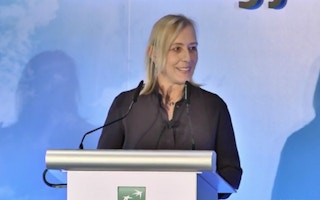The global fight for gender equality is far from over, and even countries that are perceived to be advocates of women’s empowerment have much to improve on in terms of workplace diversity and wage parity .
To continue reading, subscribe to Eco‑Business.
There's something for everyone. We offer a range of subscription plans.
- Access our stories and receive our Insights Weekly newsletter with the free EB Member plan.
- Unlock unlimited access to our content and archive with EB Circle.
- Publish your content with EB Premium.
This was the message given by 18-time Grand Slam champion and gender equality advocate Martina Navratilova at the second BNP Paribas Sustainable Future Forum on October 26 in Singapore.
In her keynote address, Navratilova told the audience of 400 about how she first learned in the 1970s that male and female tennis players were not paid equally in Grand Slam tournaments. Every year since then, Navratilova has rallied her colleagues at the Women’s Tennis Association (WTA) to demand nothing less than equal pay for each Grand Slam.
True wage equality came only three decades later in 2007 when the Wimbledon became the last of the four major tournaments to award equal prize money to its players. The US Open was the first to roll out pay parity in 1973, followed by the Australian Open in 2001 and the French Open in 2006.
Though competitive tennis may have closed the gender wage gap, the problem is rampant in society, noted Navratilova. She added that while Singapore has been a leader in narrowing the gender pay gap, on average, men in the city-state still earn 18 per cent more than women for doing the same job.
The figure may seem small but if expanded to 30 years, this means a woman has to work five more years to make the same amount of money, said Navratilova.
She also cited the example of a recent furore over pay disparity in the United Kingdom’s national broadcaster British Broadcasting Corporation (BBC), where two thirds of those earning 150 pounds a year were men.
To fix this global issue, the WTA legend called on companies to lead on advocating for equal pay and diversity in businesses comma as this would lead not just to better results financially but also have positive social impacts.
She cited a study by the McKinsey Global Institute in 2015 which found that advancing women’s equality can add as much as US$12 trillion dollars to the global economy. Data from consulting outfit Catalyst also shows that firms with women holding executive positions have a 34 per cent higher return for shareholders compared to those that do not. Gender diversity in the workplace also translates to an increase in revenue by over 40 per cent, research by MIT academics has found.
“
There is very great economic, academic and psychological research that quantifies the benefit of this kind of approach. Diversity makes greater decision-making.
Martina Navratilova, WTA tennis legend
These results prove that gender equality isn’t just lip service, just to make you look good, said Navratilova.
She added: “This makes perfect business sense. There is very great economic, academic and psychological research that quantifies the benefit of this kind of approach. Diversity makes greater decision-making.”
Businesses should also note that customers want companies to have a workforce that represents all of them, Navratilova noted.
Women make up half of the potential global workforce, a figure which showed that companies need to put women in their team to inspire creativity, productivity, among all employees at all levels, she said.
Are we on track with the 2030 Agenda?
Achieving gender equality and empowering all women and girls is a key component of the United Nation’s Sustainable Development Goals (SDGs). The UN has 17 SDGs, which are a call to action to all countries to promote prosperity while protecting the planet.
Speaking at the same forum, executive director of the United Nations Environment Programme (UNEP) Erik Solheim called on businesses and governments to do more to advance all the SDGs.
The public and private sector alike should find ways to exit the most negative and risky investments, said Solheim. For example, insurance companies should refuse to cover companies that are engaged in Illegal fishing.
The UNEP chief also pointed to the role banks play in tackling corporate violations of environmental and social principles, and said that “big money” should be aimed at delivering positive impacts on society.
“What is important is where you put your big money. It is not easy, but we can jointly find the platform and the instrument for making sure that the big money is purpose-driven and transforming the world we want to see,” he said.
The forum convened businesses, institutions and development experts to discuss the opportunities and challenges in embedding sustainability into mainstream business practices.
At a subsequent panel discussion during the event, business executives from the agribusiness, energy, and finance sectors agreed that technological innovation will eventually deliver solutions to help balance the priorities of meeting the needs of a growing global population—which is expected to balloon to 9.5 billion people by 2050 from 7.6 billion today—and ensuring that resources are used in a sustainable manner.
Panellists stressed that every company should be measuring and reporting full performance, which includes human, social and physical capital, not just profit and loss.
Eric Raynaud, BNP Paribas chief executive officer for Asia Pacific, added: “There is no longer any time to debate whether sustainability makes business sense. We must move to the ‘how’ and embed sustainable finance and investment mechanisms into financial markets globally.”
The forum was held in conjunction with the BNP Paribas WTA Finals Singapore, the world’s premier sporting event for women.










